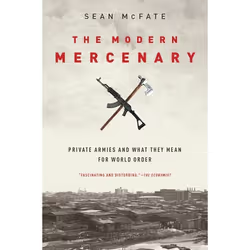
ISBN The Modern Mercenary ( Private Armies and What They Mean for World Order ) 272 pages English
ISBN The Modern Mercenary ( Private Armies and What They Mean for World Order ), Sean McFate, 272 pages, English, Oxford University Press, 29/06/2017, Any gender
Similar Products
Product Information
It was 2004 and Sean McFate had a mission in Burundi: to keep the president alive and prevent the country from spiraling into genocide without anyone knowing that the United States was involved. The United States was of course involved but only through McFate's employer the military contractor DynCorp International. Throughout Africa Latin America and the Middle East similar scenarios are playing out daily. The United States can no longer go to war or carry out covert operations without contractors. In 2010 the Pentagon's budget for private contractors was seven times the entire U.K. defense budget. How did this state of affairs come to be? How does the shadowy world of military contracting actually operate? And what do trends suggest about the future of war and international relations? We simply don't know much about the structure of the industry how private military companies operate and where this industry is heading. Typically led by ex-military men such firms are by their very nature secretive. Even the US government - the entity that actually pays them - knows relatively little. In The Modern Mercenary former industry insider Sean McFate lays bare the opaque world of private military contractors explaining the economic structure of the industry and showing in detail how firms operate on the ground. As a former paratrooper and private military contractor McFate provides an unparalleled perspective into the nuts and bolts of the industry as well as a sobering prognosis for the future of war. While at present the U.S. government and U.S. firms dominate the market private military companies are emerging from other countries and warlords and militias have restyled themselves as private security companies in places like Afghanistan and Somalia. To understand how the proliferation of private forces may influence international relations McFate looks back to the European Middle Ages when mercenaries were common and contract warfare the norm. He concludes that international relations in the twenty-first century may have more in common with the twelfth century than the twentieth. This back to the future situation which he calls neomedievalism is not necessarily a negative condition but it will produce a global system that contains rather than solves problems. A decidedly non-polemical account (a rarity in this field) The Modern Mercenary is the first work that combines a broad-ranging theory of the phenomenon with an insider's understanding of what the world of the private military industry is actually like.
Customer Reviews
Share your opinion on the product or read reviews from other members.











